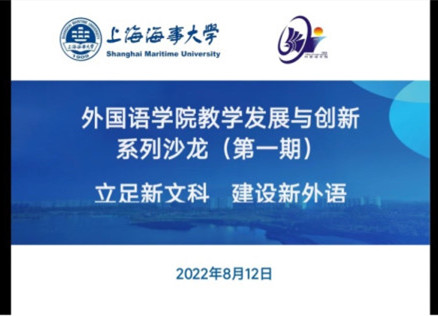With the comprehensive promotion of the new liberal arts in colleges and universities, foreign language education has once again triggered thoughts and discussions. Foreign language education belongs to the liberal arts, so it should not stay away from the new liberal arts construction, but follow the goals and paths of the new liberal arts construction, develop new foreign languages, and highlight the cultivation of students' thinking ability, intercultural communication ability and international communication ability. The first session of the salon series was successfully held online. The theme of this salon was Building a new foreign language based on new liberal arts, which was hosted by Guo Haixia, Vice Dean of Teaching and Learning of the College of Foreign Languages.
First of all, Guo Haixia introduced the origin of the concept of new liberal arts and the concept of integration and innovation of new liberal arts, pointing out that the concept of integration and innovation of new liberal arts provides guidance for the change of foreign language education in China. She pointed out that the integration and innovation of foreign language courses is conducive to increasing the depth, breadth and temperature of teaching contents and making students participate deeply in the classroom to achieve the teaching objectives. She also shared examples of cross-border integration in English and American literature courses, where the integration of interdisciplinary knowledge helped improve students' critical thinking and intercultural communication skills. Ms. Guo emphasized that teachers should become lifelong learners, adhere to the student-centered principle in teaching, and adapt to the role change from actor to director and coach.
After that, the faculty members actively exchanged speeches. Prof. Bo Zhenjie shared the harvest of the summer training and discussed how to serve the national development strategy, cultivate comprehensive talents with national sentiment and international vision, and make their own contribution to enhance the national cultural soft power and communication power in the context of teaching translation courses. Ms. Liu Huidan shared her experience in teaching practice from her own teaching, constantly upgrading the teaching mode by making addition to the traditional liberal arts, and proposed improvement measures to strengthen the teaching team construction as well as promoting teaching and learning through competitions. Ms. Wu Mengjiao introduced the development history and model of intercultural education in the summer workshop, discussed the close relationship between language and culture, and shared the models and methods that can be operated in the actual classroom. Prof. Zhang Zhiguo shared his views on the changing and unchanging professional characteristics of foreign language majors, talent training models, interdisciplinary research and reform of teaching methods. Prof. Zhou Pin shared a case of cross-border integration of language and medicine with his own research, emphasizing the need to break through limitations, and to innovate continuously through interdisciplinary cooperation and cutting from new perspectives.
In this salon, teachers actively expressed their views and opinions around the new liberal arts and foreign language education, and combined with the summer training and study, especially the recent training such as the series of teaching materials of Understanding Contemporary China, they realized that the mission of the times for the construction of the new liberal arts is to enhance the national cultural soft power, and one of the important tasks of foreign language education is to enable students to tell the Chinese story in foreign languages, to understand the Chinese story, and to tell a good China's story.

(Reported by the College of Foreign Languages office; Translated by Li Huixian)


